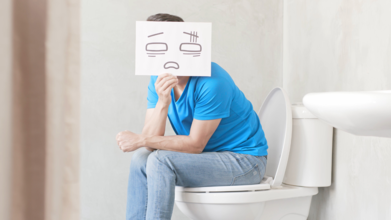- Health Conditions A-Z
- Health & Wellness
- Nutrition
- Fitness
- Health News
- Ayurveda
- Videos
- Medicine A-Z
- Parenting
- Web Stories
Delayed Grief: Why It’s Normal And How To Heal From Unresolved Emotions

Delayed Grief: Why It’s Normal And How To Heal From Unresolved Emotions
Grief, this complex and overwhelming emotion, does not work according to a schedule. It does not always arrive with the immediate shock and sadness we expect after a loss. It can appear weeks, months, or even years later, catching us off guard at the most unexpected times. Delayed grief can feel like an emotional storm, triggered by a song, a fleeting memory, or even a completely unrelated event. The experience of the unfolding of grief long after a loss might be confusing or disorienting but is actually more common than we would have imagined.
"Grief is not something that happens according to a set timeline," says Dr. Rahul Chandhok, Psychiatrist. The brain sometimes suppresses the pain of loss, prioritizing immediate survival and function, which may delay emotional responses. It is a natural part of how we process profound emotional pain. But while normal, it can be highly unsettling. Nature of Grief and Its Delayed Response
Grief is that universal experience, but it manifests differently in one case than in another. The wave of grief may break immediately for some, overcoming them with emotions at the onset of the loss. For others, however, it may be pent up as they continue managing everyday responsibilities, leaving true emotional response to surface sometime later.
Nishtha Jain, Counseling Psychologist, shares, "The priority of the brain is mostly to deal with the survival aspects of life—be it work, family, or other pressing concerns.".
Thus, it may put off the emotional pain until the person feels safer or more stable, and then grief comes rushing back. It is often a coping mechanism to delay the emotional response so that individuals can deal with immediate tasks while avoiding deeper work with emotions that grief requires. The reality of delayed grief means that many people may experience their most intense emotions long after they expect it.
For instance, a familiar song or some other event unrelated to the loss can trigger a person and make them feel the weight of sorrow they thought they had processed. This response can sometimes feel foreign, even startling, especially if the loss occurred years ago.
Impact of Delayed Grief
While the psychological, physical, and emotional weight of experiencing delayed grief is a part of the human experience, it doesn't make it any less difficult to live with.
Grief postponed tends to materialize in sudden outbursts of emotions, an everlasting sense of sadness, or wave surges triggered by completely unrelated events. Says Dr. Chandhok, "When grief is delayed, it is a sign that the emotions are not allowed to settle down and have a right to be expressed. The body and mind are finding it tough to deal with the situation and thus the result appears as fatigue, headaches, loss of appetite, and more.
This delayed grief sometimes leaves the individual with feelings of isolation. Such a person feels that no one around him or her will understand his or her grief, particularly if the loss occurred several years ago. People around them may not connect with the delayed emotions or may not even recognize that the grief has resurfaced. That feeling of not being understood often intensifies the feelings of loneliness and desperation.
Nishtha Jain adds, "Delayed grief can also prompt other mental health issues such as anxiety or depression since the person cannot integrate the unprocessed emotions. Sometimes, the brain and body cannot differentiate between emotional and physical stress, which is why unresolved grief can have such a profound impact on one's overall well-being."
Acknowledging and Validating Emotions Helps Heal
Although delayed grief can be confusing, it is important to note that it is a natural and valid part of the healing process.
It's a sign that emotions, long buried or suppressed, are now being acknowledged and processed. As Dr. Chandhok explains, "It's important to allow yourself to feel the emotions that surface, no matter how long after the event they arise.". The body and mind are working in efforts to integrate the loss into the person's life story, and only in that way can healing start happening when we allow full presence of grief.
Healing from delayed grief is not a straight line, and it may take quite some time. It will be necessary to have love from family members or help from professionals. For some people, just talking to that special friend or family member they can trust will be comfortable. For others, going to see a therapist or counselor can provide a structured space.
Give yourself the grace to process grief on your own timeline," Jain advises. "Grief isn't something that should be rushed or forced. It's a deeply personal journey, and there is no right or wrong way to feel.
Embracing the delayed response is even one aspect of healing. When a person experiences grief, they are actually able to embrace that pain in a way that becomes part of the greater narrative of recovery and growth. Instead of avoiding it or ignoring it, being honest with oneself about delayed grief opens people up for complete healing and moving on to further self-discovery.
Grief, in all its forms, does not run on a schedule. The delayed grief is just as valid as the immediate outpouring of emotions related to loss. It is a very human experience, one that warrants compassion, understanding, and patience. Whether it is immediate or years later, it is all part of the emotional healing process.
As Dr. Chandhok concludes, "Remember, it's never too late to feel, to seek help, or to heal. Grief has its own timeline, and the most important thing is to honor it—whenever it comes."
Dr. Rahul Chandhok is Head Psychiatrist, Head Consultant, Mental Health and Behavioural Science at Artemis Hospitals and Nishtha Jain is a Counselling Psychologist with a Mental Health Platform- LISSUN.
Harvard Psychologist Lists Careers Linked To Higher Rates Of Suicide: Doctors Maybe At High Risk Themselves

(Credit- Canva)
Suicides are one of the leading causes of death around the world. While it is easy to say that the person who chose to take their lives did it of their own violation, Harvard psychologist Dr. Matthew Nock, explains the other side. “90% of people who try and kill themselves say, I didn't want to die per se. I wanted to escape from seemingly intolerable.” Speaking on the On Purpose podcast with Jay Shetty, Dr. Nock pointed out that the link between work pressure and suicidal thoughts varies by race and ethnicity.
The concerning rise in suicide cases tied to work pressure has fueled a social media conversation about toxic work culture. What was once considered a normal part of the professional grind is now being openly challenged, as people share personal stories of the anxiety, depression, and isolation caused by unhealthy work environments.
What Professions Are At High Risk Of Suicide?
According to Dr. Matthew Nock, certain careers are linked to a higher risk of suicide.
Police Officers
He noted that physicians and police officers are among those at high risk. He mentioned a spike in suicides among New York City police officers, who are predominantly white men, and shared that female police officers, in particular, face a higher risk, even when accounting for factors like age, race, and ethnicity.
According to a 2025 study published in the Police Practice and Research, on average, 21.4 out of every 100,000 officers died by suicide each year.
The study showed that the suicide rate was much higher for male officers (22.7 per 100,000) than for female officers (12.7 per 100,000).
Physicians
Dr. Nock explained that access to means is a significant factor in these high-risk professions, which helps explain why physicians, police officers, and military members have a much higher risk of suicide compared to others.
Another study published in 2024 The BMJ, showed that the number of suicides among doctors has been going down, female doctors are still at a much higher risk than other people.
When looking at all the data, male doctors were found to have a 5% higher risk of suicide compared to the general population.
In a more recent analysis of the last few years, the overall suicide rate for doctors has decreased, which is good news. But even with this improvement, female doctors still have a 24% higher risk than the general public.
Why We Need To Talk More About Suicide
Dr. Nock stresses the importance of openly discussing suicide, particularly in schools. He compared it to fire drills or earthquake preparedness, saying that since 15% of people will experience suicidal thoughts, it's crucial to equip everyone with a safety plan..Dr. Matthew Nock said, "We know that asking about suicide, talking about suicide, does not make people suicidal."
He noted that the people who act on suicidal thoughts often show different signs than those who just have the thoughts. While depression is a strong predictor of having suicidal thoughts, other factors like anxiety, aggressiveness, poor behavioral control, and drug or alcohol use are more closely linked to a person actually attempting suicide.
He believes that a small educational module on suicide in health class could help save lives by teaching people what to do if they or someone they know is struggling.
Lung Cancer Rates Linked With Pollution Are Down In US, But THIS Country Is Still Suffering: Study

(Credit- Canva)
While we all know air pollution affects our health, did you know that it was actually driving cancer cases higher? This has led to a big rise in health problems worldwide. Past studies show that air pollution is linked to about seven million premature deaths each year and contributes to over 3% of all years of healthy life lost globally. This revelation was a big concern for public health, and to fix it, many measures were taken.
While some countries like the US showed promising results in bettering public health, a recent study in the International Journal of Public Health showed that this positive trend is not yet showed up in China.
How Is PM2 Pollution Affecting Our Health?
One of the most dangerous types of air pollution is called fine particulate matter, or PM2.5. These tiny particles come from car exhaust, factory smoke, and even from the smoke created by burning solid fuels inside homes. Because they are so incredibly small, they can stay suspended in the air for a long time and, when we breathe them in, they go deep into our lungs.
Once inside the body, PM2.5 can cause inflammation and even change our genes, which increases our risk for many illnesses, especially tracheal, bronchial, and lung (TBL) cancers. A new study looked at how much PM2.5 pollution has affected TBL cancer rates in China, Japan, South Korea, and the United States from 1990 to 2021.
Has Pollution-Related Health Risk Decreased Everywhere?
The study, which used data from the Global Burden of Disease (GBD) project, found some important trends:
Overall Cancer Rates Are Declining
The good news is that globally, the number of deaths and years of healthy life lost due to TBL cancer linked to PM2.5 pollution are going down. This positive trend was consistent in all the countries studied: China, Japan, South Korea, and the U.S.
China's Unique Challenge
Despite this global trend, China faced a much higher death rate from TBL cancer linked to PM2.5 compared to the other three countries. While their rates are decreasing, they still remain significantly higher than the worldwide average.
Household Pollution Hits Women Harder
The research also looked at pollution from burning solid fuels inside homes. The global death rate from TBL cancer linked to this type of pollution has remained stable, but it's actually increasing for women while it's decreasing for men. This highlights a specific danger for women in homes that rely on these fuels.
Will This Pollution Cancer Trend Keep Rising?
Looking ahead, researchers predict that the global death rate for TBL cancer caused by PM2.5 will actually increase over the next 29 years. However, the study notes that countries like China, South Korea, and the U.S. are expected to see a significant drop in their rates, while Japan's numbers are expected to stay about the same.
Overall, this study shows that while air pollution is a serious global health risk, the efforts to reduce PM2.5 exposure in many countries are making a real, positive difference.
'You’ve Been Pooping Wrong All Your Life' According To Harvard Gut Doctor, 3 Mistakes That Harm Your Health

(Credit- Canva)
Maintaining our gut health is not as easy as it seems. Even things like how you do your bowel movements could reveal how healthy your gut actually is. According to Dr. Saurabh Sethi, a board-certified gastroenterologist, many of us are making common mistakes on the toilet that can lead to real health problems. Here are three crucial habits to change to improve your gut health. Here are three mistakes' people make will they are in the washroom.
3 Bathroom Mistakes You Are Making
Stop Straining
Pushing or straining when you poop can cause serious issues like hemorrhoids, which are swollen veins in your rectum and anus, and anal fissures, which are small tears in the lining of your anus. In more severe cases, it can even lead to rectal prolapse, where part of the rectum slides out of the anus. Instead of forcing it, focus on taking deep breaths. This helps your abdominal muscles relax and allows your body to do its job naturally, reducing the risk of painful complications.
Put Down Your Phone
Scrolling on your phone while on the toilet can be a bad habit. Spending extra time on the toilet, even if you’re not straining, puts pressure on the delicate veins in your rectum. This can cause them to swell, significantly increasing your risk of hemorrhoids. To protect yourself, it’s best to keep your bathroom breaks short—ideally, under five minutes.
Don't Ignore the Urge
When you feel the need to poop, it's important not to hold it in, which makes it much more difficult to pass later, leading to and worsening constipation. When you feel the need to go, listen to your body. Holding it in causes your stool to get harder and drier, which makes constipation much worse and more painful later on. Train your gut to go when it says it's time.
Simple Ways To Improve Your Bowel Movements
Go at the Same Time Each Day
Try to create a routine. If you're often straining without success, try sitting on the toilet about 30-60 minutes after a meal, when your colon is naturally more active. A little stretching or a short walk beforehand can also help things get moving.
Use a Stool for Your Feet
The natural position for a bowel movement is squatting. You can mimic this position on a regular toilet by placing a small stool under your feet to raise your knees above your hips. This simple change helps your muscles relax and can make bowel movements easier and more complete.
Focus on Fiber and Fluids
Fiber is essential for creating soft stool that's easy to pass. Most adults should aim for 25 to 35 grams a day. Just remember to add it to your diet slowly. As you increase your fiber, be sure to drink more water and other non-caffeinated fluids, since caffeine can dehydrate you and make stool harder.
When to Seek Help
While these tips are a great starting point, sometimes you need more personalized help. You should talk to your doctor if you notice any of these signs:
- A recent, unexplained change in your bowel habits
- Blood in your stool
- Unexplained stomach pain
- A pelvic health physical therapist can also provide a full evaluation and create a personalized plan to improve your bowel health.
© 2024 Bennett, Coleman & Company Limited

